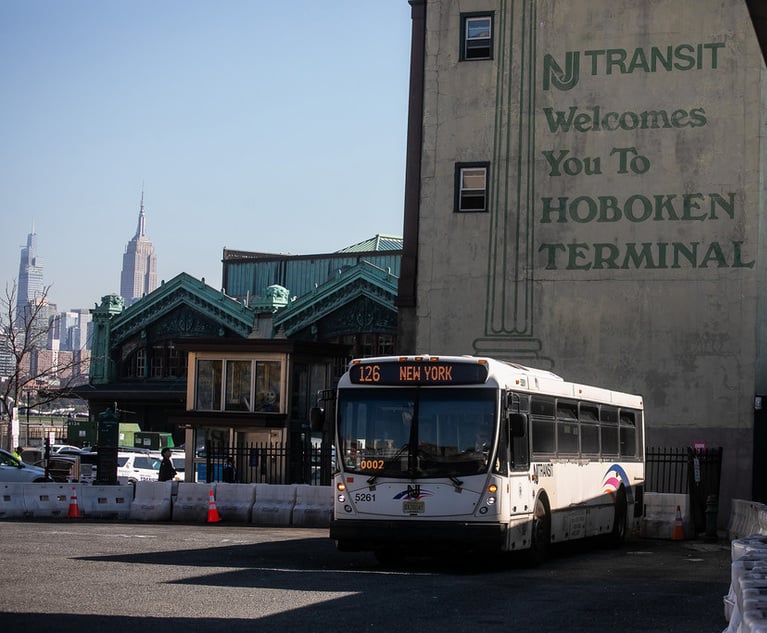 Americans with Disabilities Act/Creator: designer491/Shutterstock.com
Americans with Disabilities Act/Creator: designer491/Shutterstock.comCharter Bus Company Settles US Attorney's ADA Case
Academy has agreed to implement policies and procedures to ensure that persons with disabilities receive accessible transportation on the day and at the time and place requested.
February 07, 2020 at 06:38 PM
3 minute read
The U.S. Attorney's Office for the District of New Jersey recently announced a settlement with Academy Express LLC after the charter bus company was accused of failing to accommodate a 74-year-old disabled war veteran.
Academy has agreed to implement policies and procedures to ensure that persons with disabilities receive accessible transportation on the day and at the time and place requested, publish on its website a statement of that policy, and provide mandatory employee training on the American with Disabilities Act in accordance with regulatory requirements, according to the Feb. 6 release from the U.S. Attorney's Office.
Academy also is to pay a $10,000 civil penalty to the government and $10,000 in damages to the veteran, the office said.
U.S. Attorney Craig Carpenito said in the release that his office "remains resolute in its commitment to honor those sacrifices and ensure that the rights of service members and veterans be respected.
"Through our enforcement of the ADA, we will continue to protect veterans and other individuals with disabilities from unequal and unfair treatment," Carpenito said.
Joseph Ferrara, the attorney for Hoboken-based Academy Express, was not available for comment.
Special Assistant U.S. Attorney Victor Williamson of the office's Civil Rights Unit handled the case for the government.
The complaint alleged that the charter bus company failed to fulfill requirements under the ADA when it denied the veteran, who is a paraplegic and not identified by name in the release, access to a bus with a working wheelchair lift or a replacement bus with a working lift, to attend a group outing. The veteran sought to join dozens of his fellow combat unit veterans on an Academy charter bus for a multiday "Honor Flight" tour of Arlington National Cemetery and other Washington, D.C., area sites.
Although the group's organizer had requested, over a month in advance, that at least one of Academy's charter buses for the tour have a working wheelchair lift to accommodate the veteran, no such buses were made available for him, according to the complaint.
The veteran was a staff sergeant in the Army's 189th Assault Helicopter Company, and served in Vietnam in 1968 and 1969. He became a paraplegic after his helicopter was gunned down in Vietnam, according to the complaint. The office said he suffers from combat-related post-traumatic stress disorder and "was separated from his comrades for the Arlington trip and endured lengthy, embarrassing, and unsuccessful attempts to board him on an inaccessible bus."
The office said that if a request is made within 48 hours of a trip, a bus operator must make a reasonable effort to provide a wheelchair lift for the passenger and must also establish a system of regular and frequent maintenance checks of wheelchair lifts to determine if they are operative.
The charter company should also train its employees in the proper operation and maintenance of such equipment, according to ADA standards.
Academy is to address all three areas in the settlement, the office said.
The ADA turns 30 this year, noted Carpenito.
This content has been archived. It is available through our partners, LexisNexis® and Bloomberg Law.
To view this content, please continue to their sites.
Not a Lexis Subscriber?
Subscribe Now
Not a Bloomberg Law Subscriber?
Subscribe Now
NOT FOR REPRINT
© 2024 ALM Global, LLC, All Rights Reserved. Request academic re-use from www.copyright.com. All other uses, submit a request to [email protected]. For more information visit Asset & Logo Licensing.
You Might Like
View All
Hit by Mail Truck: Man Agrees to $1.85M Settlement for Spinal Injuries

$945K Settlement Reached in Fatal Crash After Truck Driver Fell Asleep at Wheel
3 minute read
'That's Insane': Lawyers Weigh In on Fallout From Uber's User Agreement
7 minute read
NY's Top Court Mulls Fate of Personal Injury Claims Against NJ Transit Corp.
Trending Stories
Who Got The Work
Michael G. Bongiorno, Andrew Scott Dulberg and Elizabeth E. Driscoll from Wilmer Cutler Pickering Hale and Dorr have stepped in to represent Symbotic Inc., an A.I.-enabled technology platform that focuses on increasing supply chain efficiency, and other defendants in a pending shareholder derivative lawsuit. The case, filed Oct. 2 in Massachusetts District Court by the Brown Law Firm on behalf of Stephen Austen, accuses certain officers and directors of misleading investors in regard to Symbotic's potential for margin growth by failing to disclose that the company was not equipped to timely deploy its systems or manage expenses through project delays. The case, assigned to U.S. District Judge Nathaniel M. Gorton, is 1:24-cv-12522, Austen v. Cohen et al.
Who Got The Work
Edmund Polubinski and Marie Killmond of Davis Polk & Wardwell have entered appearances for data platform software development company MongoDB and other defendants in a pending shareholder derivative lawsuit. The action, filed Oct. 7 in New York Southern District Court by the Brown Law Firm, accuses the company's directors and/or officers of falsely expressing confidence in the company’s restructuring of its sales incentive plan and downplaying the severity of decreases in its upfront commitments. The case is 1:24-cv-07594, Roy v. Ittycheria et al.
Who Got The Work
Amy O. Bruchs and Kurt F. Ellison of Michael Best & Friedrich have entered appearances for Epic Systems Corp. in a pending employment discrimination lawsuit. The suit was filed Sept. 7 in Wisconsin Western District Court by Levine Eisberner LLC and Siri & Glimstad on behalf of a project manager who claims that he was wrongfully terminated after applying for a religious exemption to the defendant's COVID-19 vaccine mandate. The case, assigned to U.S. Magistrate Judge Anita Marie Boor, is 3:24-cv-00630, Secker, Nathan v. Epic Systems Corporation.
Who Got The Work
David X. Sullivan, Thomas J. Finn and Gregory A. Hall from McCarter & English have entered appearances for Sunrun Installation Services in a pending civil rights lawsuit. The complaint was filed Sept. 4 in Connecticut District Court by attorney Robert M. Berke on behalf of former employee George Edward Steins, who was arrested and charged with employing an unregistered home improvement salesperson. The complaint alleges that had Sunrun informed the Connecticut Department of Consumer Protection that the plaintiff's employment had ended in 2017 and that he no longer held Sunrun's home improvement contractor license, he would not have been hit with charges, which were dismissed in May 2024. The case, assigned to U.S. District Judge Jeffrey A. Meyer, is 3:24-cv-01423, Steins v. Sunrun, Inc. et al.
Who Got The Work
Greenberg Traurig shareholder Joshua L. Raskin has entered an appearance for boohoo.com UK Ltd. in a pending patent infringement lawsuit. The suit, filed Sept. 3 in Texas Eastern District Court by Rozier Hardt McDonough on behalf of Alto Dynamics, asserts five patents related to an online shopping platform. The case, assigned to U.S. District Judge Rodney Gilstrap, is 2:24-cv-00719, Alto Dynamics, LLC v. boohoo.com UK Limited.
Featured Firms
Law Offices of Gary Martin Hays & Associates, P.C.
(470) 294-1674
Law Offices of Mark E. Salomone
(857) 444-6468
Smith & Hassler
(713) 739-1250






